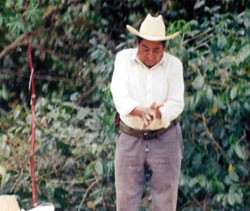
Eighty-year-old Rogelio Vazquez doesn’t have to work on his Oaxaca coffee farm as often as he used to, now that his four sons have assumed responsibility for the family business. In Mexico, supporting a family on coffee income was never easy, but now that he has adopted new methods and new markets, Rogelio is able to support his four sons and 36 members of their extended family.
In 1997, after prices reached an all-time high of $200 a bag (equivalent to 132 pounds or 60 kilograms), the market for Mexican-produced coffee collapsed. Prices fell to $40 a bag. Rogelio and other farmers were sometimes told that their coffee was sub-standard and that they had to adopt growing techniques that they didn’t understand. Confused, the Vazquezes switched from coffee production to cattle ranching — to no success.
Then in 2001, a cooperative board supported by USAID began marketing Chiapan beans directly to Starbucks, one of the world’s largest purveyors of coffee. Starbucks agreed to buy all the coffee the farmers could produce — if they met certain criteria for quality, growing methods and operational transparency. USAID helped show the farmers how to meet these standards, as well as how to increase the area being farmed, strengthen their business associations and bring other farmers into the trade agreement.
With coffee prices now at $100 a bag and climbing, Rogelio finally has some time to relax.







Comment
Make a general inquiry or suggest an improvement.